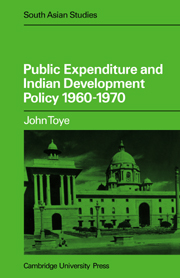Book contents
- Frontmatter
- Contents
- List of Tables
- Preface
- List of Abbreviations
- Introduction
- PART ONE GENERAL
- 1 Public expenditure and state accumulation in theory
- 2 Indian nationalism and the state accumulation policy
- 3 The interpretation of Indian public expenditure statistics
- PART TWO EMPIRICAL EVIDENCE
- PART THREE CONCLUSIONS
- APPENDICES
- List of works cited
- Index
3 - The interpretation of Indian public expenditure statistics
from PART ONE - GENERAL
Published online by Cambridge University Press: 09 January 2010
- Frontmatter
- Contents
- List of Tables
- Preface
- List of Abbreviations
- Introduction
- PART ONE GENERAL
- 1 Public expenditure and state accumulation in theory
- 2 Indian nationalism and the state accumulation policy
- 3 The interpretation of Indian public expenditure statistics
- PART TWO EMPIRICAL EVIDENCE
- PART THREE CONCLUSIONS
- APPENDICES
- List of works cited
- Index
Summary
Having said something, however brief and inadequate, about the broad economic and political background to postindependence development policy, one more preliminary is necessary before confronting the empirical evidence of the behaviour of public expenditure. The statistical material to be presented on the subject, and the implications of using one data set rather than another do not always immediately suggest themselves, even to readers who have been trained to be sensitive to such things. If the reader is to have some confidence in the solidity of the conclusions of the later chapters, he must first be reminded of the problems inherent in getting meaning out of public expenditure statistics, and satisfied that these problems have been handled (they will never be solved) in the most reasonable way. The present chapter is an attempt to do this. As it will appear, the choice of definitions is never straightforward, but need not be arbitrary. It raises often large and fundamental questions, such as the nature of government, the causes of economic growth and the value of education. These questions have been discussed here not exhaustively or for their own sake, but only as far as is necessary to decide which of the possible alternative frameworks for recording public expenditure has, on the balance of advantages, the greatest relevance for understanding the working of a state accumulation policy.
- Type
- Chapter
- Information
- Public Expenditure and Indian Development Policy 1960–70 , pp. 49 - 82Publisher: Cambridge University PressPrint publication year: 1981
- 1
- Cited by



